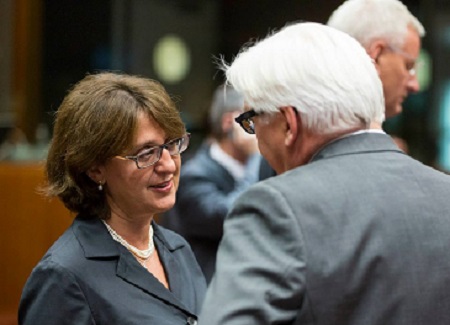Georgia’s MFA attends EU Foreign Affairs meeting in Brussels

Georgia’s Foreign Minister Maia Panjikidze is in Brussel to announce Georgia’s Parliament’s ratification of the European Union (EU)-Georgia Association Agreement (AA), to EU Foreign Ministers.
Parliament ratified the document with 123 votes in favour and zero against. The AA was signed in Brussels on June 27 by representatives of the EU and Georgia, with the aim of setting up an all-embracing framework to conduct bilateral relations.
At the plenary session of the Foreign Affairs Council on Eastern Partnership on Tuesday, Panjikidze focused on the implementation procedures of the AA.
After meeting various EU Foreign Ministers, Panjikidze said: "I asked the EU Foreign Ministers to complete the ratification process of the EU-Georgia Association Agreement”.
She also said she had received support from her EU counterparts as Georgia looked to implement the AA.
"EU Foreign Ministers praised the instruments that are planned to be used for the implementation of the AA,” Panjikidze said.
The Deep and Comprehensive Free Trade Area (DCFTA) agreement, which is the part of the Association Agreement, will be implemented from September 1, 2014, as it does not need to be ratified by the Parliaments of all 28 EU member states.
EU Foreign Policy chief Catherine Ashton held a briefing after the EU Foreign Ministers meeting and said she was particularly pleased that following swift ratification by Moldova, the EU had also seen unanimous ratification by Georgia of the AA and DCFTA.
"I want to congratulate them for that achievement,” Ashton said.
Meanwhile, in Commissioner Stefan Fule’s remarks at the plenary session of the Foreign Affairs Council on Eastern Partnership, he said the signature of AA agreements with Georgia, Moldova and Ukraine was "a historic milestone” that would open up each country to a qualitatively new level of relations.
"Implementation is now the key. The EU will be alongside partners every step of the way. The more ambitious and willing partners are, the more concrete results can be achieved,” Fule said.
"[We will] continue exploring ways in which we can help partners meet challenges through strong political support combined with provision of technical and financial assistance.”
Fule also believed the EU needed to talk to "local people in their own languages” and show examples of concrete projects that could impact their daily lives, as a result of the AA.
 Tweet
Tweet  Share
Share